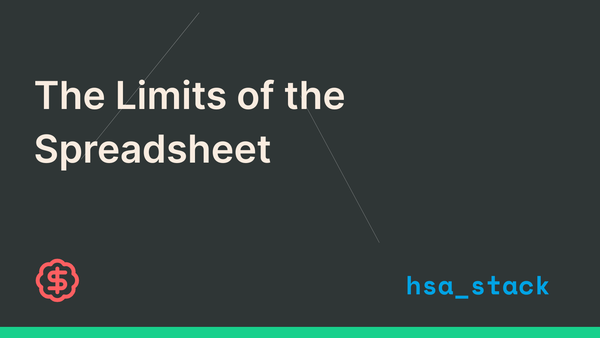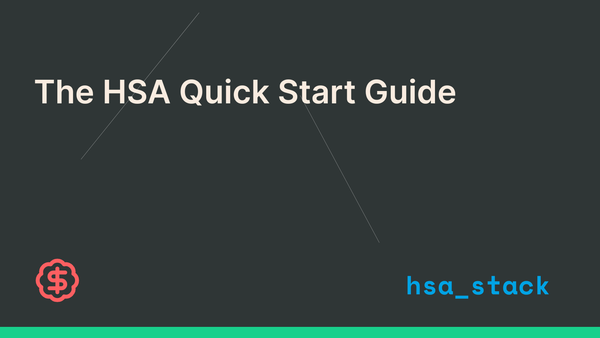Understanding Potential HSA Changes in a 2025 Budget Bill Passed by the House
A 2025 budget bill recently passed by the U.S. House of Representatives includes provisions that could alter Health Savings Accounts. Learn about potential effects, including contribution limits and rollover rules.
Individuals who strategically use their Health Savings Accounts (HSAs) as part of their long-term financial planning should be aware of recent legislative activity. A 2025 budget bill, passed by the U.S. House of Representatives on May 22, 2025, includes several provisions that propose changes to how HSAs function.
At hsa_stack, our focus is on providing efficient tools for HSA management. We aim to help users seamlessly capture and classify expenses, optimize and grow their funds, and maintain records that are consistently audit-ready. Understanding potential legislative shifts is part of informed HSA management. Here’s an overview of some key proposals from the bill.
Key Proposed HSA Modifications in the House-Passed Bill:
The bill contains several items that could impact HSAs. Notable points include:
- Increased Contribution Limits: The bill proposes to raise annual HSA contribution limits.
- It suggests adding an extra $4,300 (self‑only) or $8,550 (family) to the ordinary 2025 limits. This means the combined cap could potentially jump to $8,600 for self-only and $17,100 for family coverage for taxpayers below certain income thresholds.
- This additional contribution amount is proposed to be phased out for single filers with an Adjusted Gross Income (AGI) between $75,000 and $100,000, and for joint filers with an AGI between $150,000 and $200,000.
- Potential Impact: Higher contribution limits would allow more funds to be placed in a tax-advantaged HSA.
- HSA Funds for Fitness Expenses: The bill proposes allowing HSA funds for certain sport and fitness expenses, with potential annual limits of $500 for single taxpayers and $1,000 for joint filers.
- Potential Impact: This could broaden the definition of HSA-eligible expenses.
- Continued Contributions for Working Seniors on Medicare Part A: This would allow individuals 65 or older to continue HSA contributions if they are covered by an HSA-qualified high-deductible health plan (HDHP), provided they are enrolled only in Medicare Part A. Enrollment in Medicare Parts B, C, or D would still prevent HSA contributions.
- Potential Impact: This could extend the period for tax-advantaged contributions for some individuals.
- FSA/HRA Rollover to HSA: This proposal would permit a one-time rollover of unused Flexible Spending Account (FSA) or Health Reimbursement Arrangement (HRA) funds to an HSA.
- This option is intended for employees who newly elect HDHP coverage. The rollover amount would be limited, potentially to the annual FSA contribution cap (e.g., $3,200 for 2025, possibly doubled for family coverage under certain FSA plan structures).
- Potential Impact: This could allow individuals to consolidate funds into an HSA.
Other Proposed Adjustments: Further changes in the House-passed bill include treating individual market bronze and catastrophic plans as HSA-qualified HDHPs, ensuring Direct Primary Care (DPC) arrangements (with certain fee limits) do not disqualify HSA eligibility, and allowing medical expenses incurred up to 60 days before HSA establishment to be qualified if the HSA is set up when HDHP coverage begins.
Understanding the Potential Consequences:
These proposed changes, if they become law, could alter aspects of HSA utilization:
- Contribution Capacity: Revised limits would directly affect the amount that can be saved and invested.
- Expense Eligibility: New categories for eligible expenses could change how funds are used.
- Eligibility Rules: Adjustments could impact contribution eligibility for certain individuals.
hsa_stack: Prepared for HSA Evolution
hsa_stack is committed to helping users navigate HSA management and cultivate financial confidence through intelligent optimization.We are monitoring these legislative proposals. Should any become law, our platform will be updated to help you:
- Manage contributions and track expenses with clarity.
- Utilize AI-Powered Receipt Processing for any new eligible expense types.
- Maintain detailed records suitable for audit purposes.
- Employ smart reimbursement strategies in accordance with current regulations.
Staying informed is part of sound financial planning.
Ready to use hsa_stack to help you manage your HSA with precision? Join our waitlist.
(Disclaimer: This blog post is for informational purposes and not financial, legal, or tax advice. The legislative proposals discussed, though part of a bill passed by the House of Representatives, are subject to change during the Senate review process and have not been enacted into law. Consult qualified professionals for advice specific to your circumstances.)




